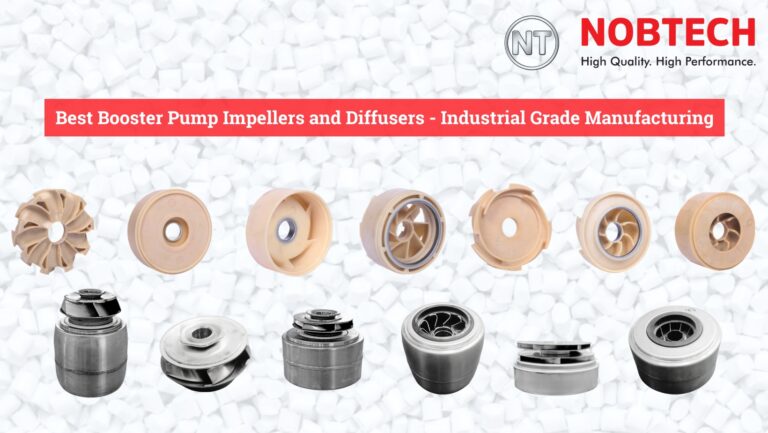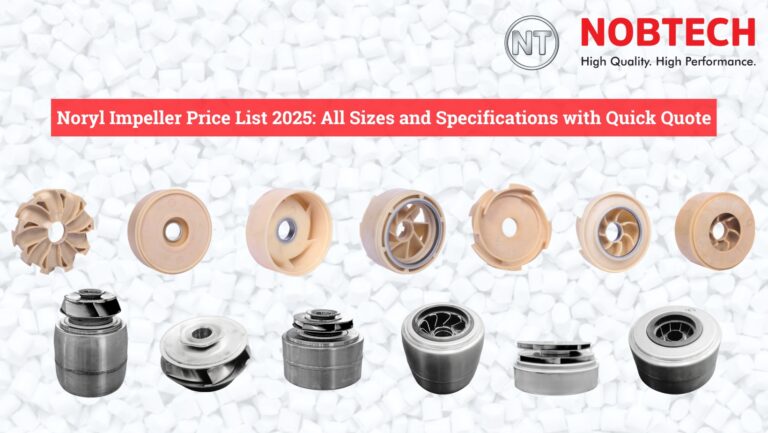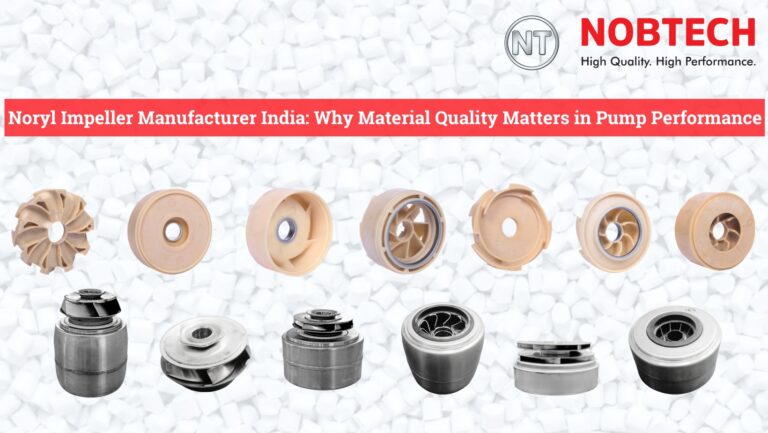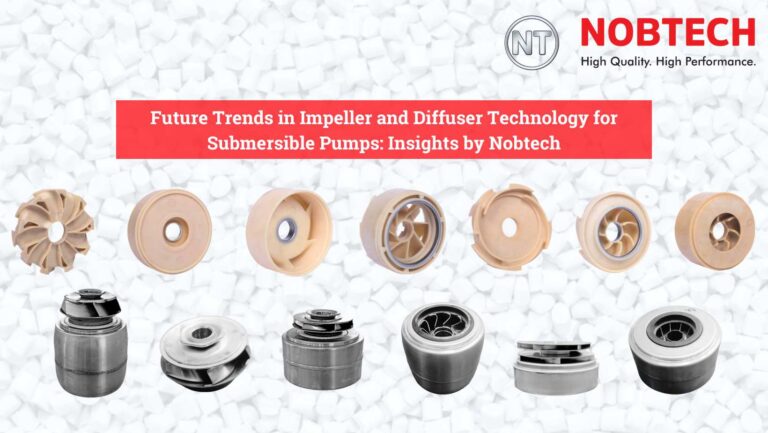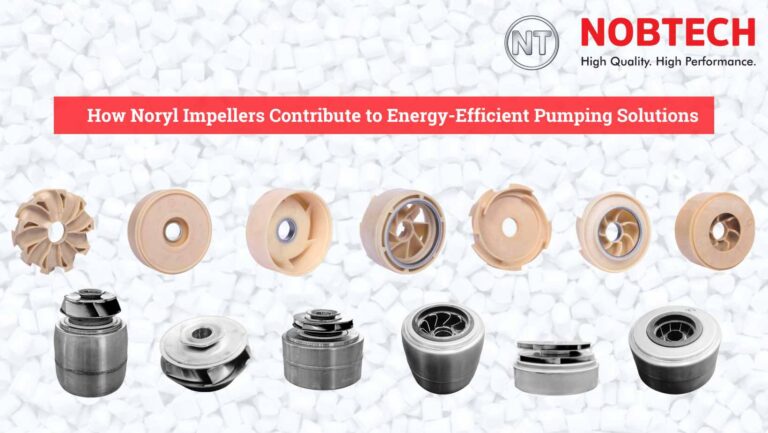Choosing the Right Diffuser Material for Your Pump: A Guide by Nobtech
Selecting the appropriate diffuser material is a crucial decision that significantly impacts the performance, longevity, and overall cost-effectiveness of any pumping system. The diffuser, working in tandem with the impeller, plays a vital role in converting the velocity energy imparted to the fluid into pressure energy. This process is fundamental to the pump’s hydraulic efficiency. Therefore, understanding the properties of various materials and how they align with specific application requirements is paramount for pump manufacturers, exporters, OEMs, and large-scale procurement agents aiming for optimal system design and reliability. Making an informed choice involves balancing factors like corrosion resistance, wear characteristics, structural integrity under pressure, temperature tolerance, and budget constraints. This decision is central to achieving the desired operational outcomes and ensuring customer satisfaction, making the process of Choosing the Right Diffuser Material for Your Pump: A Guide by Nobtech an essential consideration.
The Critical Role of the Pump Diffuser
Before diving into materials, it’s essential to understand the diffuser’s function within a multistage centrifugal pump, particularly submersible pumps where they are commonly found. As fluid exits the impeller at high velocity, it enters the diffuser’s carefully designed passages. These passages gradually expand, slowing the fluid down. According to Bernoulli’s principle, this reduction in kinetic energy (velocity) results in an increase in potential energy (pressure). The diffuser guides the fluid smoothly towards the next stage impeller or the pump outlet, minimizing turbulence and energy losses. An efficiently designed diffuser, made from the right material, maximizes this pressure conversion, directly contributing to the pump’s overall head generation and efficiency. Damage or excessive wear on the diffuser can lead to significant performance degradation, increased energy consumption, and premature pump failure.
Why Diffuser Material Selection is Paramount
The operating environment of a pump diffuser is often demanding. It’s constantly exposed to the pumped fluid, which can range from clean water to abrasive slurries or corrosive chemicals. High flow rates can cause erosion, while suspended solids contribute to abrasion. Temperature fluctuations and operating pressures add further stress. Consequently, the material chosen must withstand these challenges over the pump’s expected service life. An incorrect material choice can lead to rapid wear, cavitation damage, corrosion, or even structural failure, resulting in costly downtime, repairs, and potential damage to other system components. For businesses involved in pump manufacturing and distribution, like those served by NOBTECH, ensuring the reliability of components like diffusers is key to maintaining brand reputation and customer loyalty. The task of Choosing the Right Diffuser Material for Your Pump: A Guide by Nobtech involves carefully weighing these operational realities against material properties.
Common Diffuser Materials: An Overview
Historically, pump diffusers have been manufactured from a variety of materials, each with its own set of advantages and disadvantages:
- Cast Iron: Often used for its lower initial cost and good strength in non-corrosive applications like clean water transfer. However, it is susceptible to rust and corrosion, particularly in aggressive water conditions or chemical applications, and can be heavy.
- Bronze: Offers better corrosion resistance than cast iron, especially in brackish or seawater applications. It is generally more expensive than cast iron but less resistant to abrasion than stainless steel.
- Engineered Plastics (e.g., Noryl): Materials like Noryl (a blend of polyphenylene oxide – PPO and polystyrene – PS) offer excellent corrosion resistance, are lightweight, and can be cost-effective to manufacture through injection molding. They are particularly suitable for clean water applications but may have limitations regarding temperature, pressure, and abrasive resistance compared to metals.
- Stainless Steel: Known for its excellent corrosion resistance, high strength, durability, and resistance to wear and abrasion. Different grades of stainless steel offer varying levels of resistance, making it versatile for a wide range of demanding applications, including those involving corrosive fluids or higher temperatures.
While cast iron and bronze have their place, modern pump design, especially for submersible applications, frequently leans towards stainless steel and engineered plastics like Noryl due to their superior performance characteristics in specific contexts. NOBTECH specializes in manufacturing components from these advanced materials.
Stainless Steel Diffusers: The Robust Choice
Stainless steel stands out for its exceptional combination of strength, durability, and corrosion resistance. This makes it an ideal material for diffusers in demanding applications.
Advantages of Stainless Steel
Its primary advantage lies in its resistance to corrosion and rust, even when handling moderately aggressive fluids or water with high mineral content. This longevity translates to reduced maintenance and longer pump life. Stainless steel also exhibits excellent resistance to erosion caused by high flow velocities and abrasion from suspended particles, outperforming many other materials in challenging conditions. Its inherent strength allows diffusers to maintain their precise geometry under high pressure, ensuring consistent hydraulic performance. NOBTECH, recognizing these benefits, focuses on manufacturing high-quality Stainless Steel Submersible Pump Impellers and Bowls, components that work synergistically with diffusers to create durable and efficient pump stages. For applications requiring maximum reliability and long service intervals, stainless steel is often the preferred option. The consideration when Choosing the Right Diffuser Material for Your Pump: A Guide by Nobtech often points to stainless steel for harsh environments.
Applications
Stainless steel diffusers are widely used in submersible pumps for deep wells, irrigation, industrial processing, water treatment plants, mining dewatering, and applications involving slightly corrosive fluids or higher temperatures where plastics might degrade. Global pump manufacturers targeting these demanding markets rely on suppliers like NOBTECH for consistent quality in stainless steel components.
Noryl Diffusers: Precision and Value
Noryl, a modified PPO thermoplastic, has gained significant traction as a diffuser material, particularly in submersible pumps designed for clean water applications. Its properties offer a compelling alternative to traditional metals in specific scenarios.
Advantages of Noryl
Noryl’s key strengths include its excellent resistance to hydrolysis (degradation by water) and its inherent resistance to corrosion – it simply doesn’t rust. This makes it ideal for potable water systems. Its smooth surface finish, achievable through precision injection molding, contributes to hydraulic efficiency by reducing friction losses. Noryl is significantly lighter than metals, which can simplify pump assembly and installation. Furthermore, injection molding allows for complex shapes to be produced cost-effectively in high volumes. NOBTECH leverages these advantages by specializing in the production of Noryl Submersible Pump Impellers and Diffusers, providing high-precision, reliable components to its clients. Choosing the Right Diffuser Material for Your Pump: A Guide by Nobtech frequently highlights Noryl for cost-sensitive, high-volume clean water applications.
Applications
Noryl diffusers excel in applications involving clean, cold water, such as domestic water supply, residential wells, boosting systems, and light commercial use. They are a popular choice for manufacturers producing pumps where cost-effectiveness and corrosion resistance in non-abrasive environments are primary concerns. NOBTECH serves numerous pump OEMs globally who utilize their Noryl components for these exact markets.
Comparing Stainless Steel and Noryl Diffusers
The choice between stainless steel and Noryl often comes down to the specific requirements of the application and the priorities of the pump manufacturer or end-user.
- Corrosion Resistance: Both offer excellent corrosion resistance, but stainless steel generally handles a wider range of chemical compositions and higher temperatures. Noryl is superb in standard water conditions but may be unsuitable for certain chemicals or elevated temperatures.
- Wear & Abrasion: Stainless steel significantly outperforms Noryl in resisting abrasion from sand or other suspended solids. Noryl is best suited for clean fluid applications.
- Strength & Pressure: Stainless steel offers higher tensile strength and rigidity, making it suitable for higher-pressure, multi-stage pumps and deeper settings. Noryl has good strength but may have limitations at extreme pressures or temperatures.
- Weight: Noryl is considerably lighter, which can be an advantage during manufacturing and installation.
- Cost: Noryl components, manufactured via injection molding, can offer cost advantages, especially in high-volume production runs. Stainless steel typically has a higher material cost and potentially more involved manufacturing processes.
- Hydraulic Efficiency: Both materials can be formed into efficient hydraulic shapes. Noryl’s smooth molded surface can offer slight advantages in reducing surface friction in clean water.
Choosing the Right Diffuser Material for Your Pump: A Guide by Nobtech emphasizes a careful evaluation of these trade-offs. For high durability, abrasive conditions, or chemical compatibility, stainless steel is often superior. For cost-effective, high-volume clean water pumps, Noryl presents a very strong case.
Best diffuser material for pumps: Factors for Pump Manufacturers and OEMs
When selecting the optimal diffuser material, pump manufacturers, exporters, and OEMs served by NOBTECH must consider several key factors tailored to their target markets and product lines:
- Fluid Characteristics: Is the fluid clean water, chemically aggressive, abrasive, or at an elevated temperature? This is often the primary determinant. Stainless steel offers broader compatibility, while Noryl excels in clean water.
- Operating Conditions: What are the maximum pressure and temperature requirements? Ensure the chosen material can withstand the operational stresses without deformation or degradation.
- Required Lifespan & Reliability: What are the end-user expectations for pump longevity and maintenance intervals? Stainless steel generally offers longer life in demanding conditions.
- Target Market & Application: Is the pump intended for domestic use, industrial processing, agriculture, or mining? Matching the material to the application ensures performance and avoids premature failure.
- Cost Considerations: Balance the initial component cost against the total cost of ownership, including potential maintenance and replacement. Noryl can reduce upfront costs, while stainless steel may offer better long-term value in harsh environments. Partnering with a reliable supplier like NOBTECH ensures access to high-quality options in both Stainless Steel (view products) and Noryl, facilitating informed decisions.
- Supply Chain & Manufacturing: Consider the manufacturing processes involved (casting, machining, injection molding) and the reliability of the component supplier. NOBTECH provides robust supply chain solutions for global pump manufacturers.
Making the right decision requires a holistic view of these factors, ensuring the final pump product meets performance specifications and market expectations. Choosing the Right Diffuser Material for Your Pump: A Guide by Nobtech is integral to this strategic product development process.
NOBTECH: Your Partner for Premium Pump Components
NOBTECH (https://nobtech.in/) stands as a leading manufacturer specializing in critical components for submersible pumps. With a dedicated focus on Stainless Steel Submersible Pump Impellers and Bowls and Noryl Submersible Pump Impellers and Diffusers, NOBTECH provides high-quality, precision-engineered parts essential for building reliable and efficient pumps. Serving global pump manufacturers, exporters, OEMs, and large-scale procurement agents, NOBTECH understands the technical and commercial requirements of the industry. Their commitment to quality manufacturing ensures that whether you choose stainless steel for its robustness or Noryl for its value and corrosion resistance in specific applications, you receive components that meet stringent performance standards. Engaging with NOBTECH simplifies the procurement process, offering dependable solutions that enhance pump performance and durability. The expertise offered by NOBTECH is invaluable when undertaking the task of Choosing the Right Diffuser Material for Your Pump: A Guide by Nobtech.
Frequently Asked Questions (FAQs)
- What is the main difference between a Noryl and a Stainless Steel diffuser in a pump? The primary differences lie in abrasion resistance, temperature/pressure limits, and cost. Stainless steel offers superior durability against abrasion and higher operating limits, while Noryl provides excellent corrosion resistance in clean water at a potentially lower cost and weight.
Choosing the Right Diffuser Material for Your Pump: A Guide by Nobtechdepends heavily on the specific application’s demands. - Can Noryl diffusers handle hot water? Noryl has temperature limitations compared to stainless steel. While suitable for standard cold and warm water applications, it’s generally not recommended for continuous operation with very hot water, where stainless steel would be a more appropriate choice. Always consult material specifications for exact temperature ratings.
- Is stainless steel always better than Noryl for pump diffusers? Not necessarily. For clean water applications where cost and weight are significant factors, Noryl can be an excellent and highly efficient choice. Stainless steel is ‘better’ in applications involving abrasion, higher pressures, wider temperature ranges, or specific chemical compatibility requirements. The ‘best’ material is application-dependent. NOBTECH manufactures high-quality versions of both to meet diverse needs.
Wrapping Up!
This blog shares a lot about “Best diffuser material for pumps”
To know more about stainless steel and Noryl submersible impellers and bowls, visit- https://nobtech.in/products/
To explore solar pumps and pumping systems, do visit- https://www.slekaind.com/


